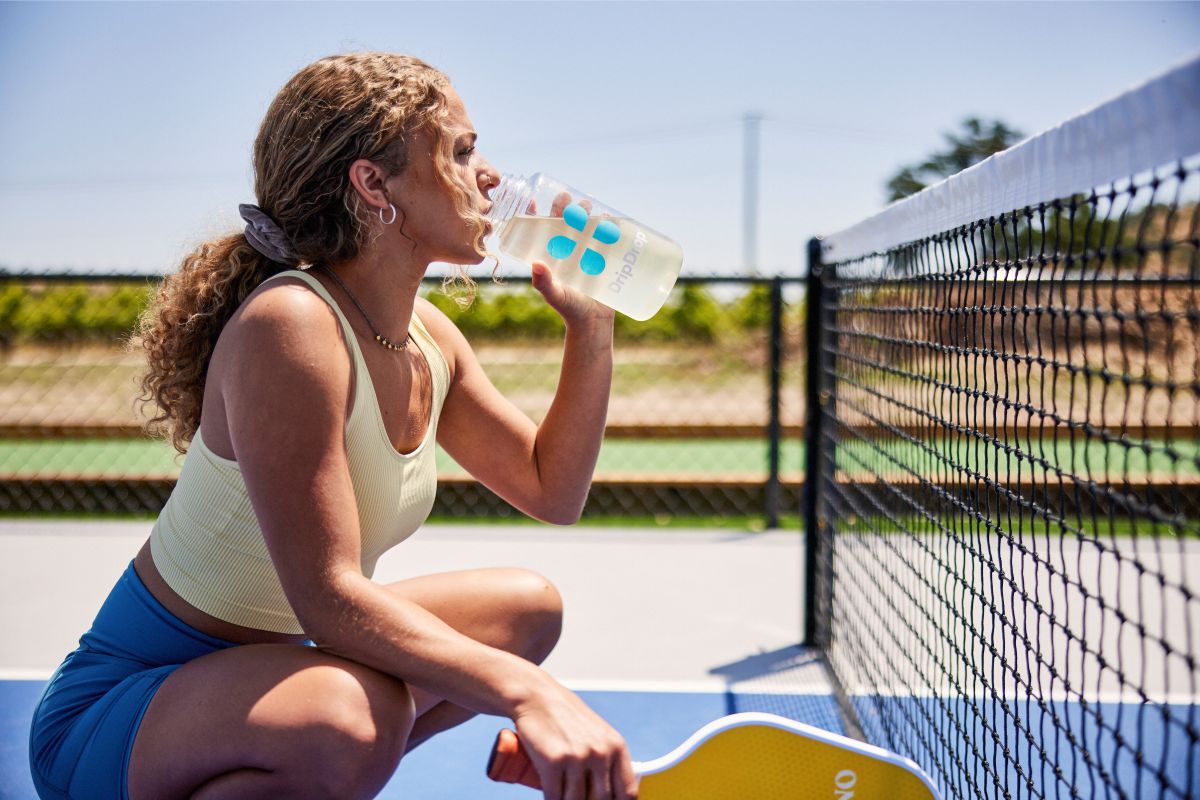The word “electrolytes” is thrown around a lot — especially when it comes to sports drink advertisements. But what are electrolytes?
Electrolytes are not just for athletics and active people; they are necessary components for bodily functions including fluid balance, nervous system regulation, and muscle maintenance. Electrolytes’ benefits are numerous and integrating these vitamins and minerals into your daily life is essential.
When dissolved in water, electrolytes emit an electrical charge, which allows them to transmit electrical signals throughout the body. Sodium, potassium, magnesium, calcium, chloride, zinc, and phosphorus are all examples of common electrolytes, and you may already know some foods that contain these minerals.
However, simply eating foods with electrolytes isn’t enough to ensure electrolyte benefits and proper balance. Electrolytes work together, so balancing their levels is essential to all functions they carry out. Adding an electrolyte drink mix like DripDrop to your daily routine can help boost your electrolyte levels and reap the benefits of drinking electrolytes.
Read on to learn more about electrolytes and hydration, benefits of electrolytes, and how they work together.
Electrolyte Benefits
The benefits of electrolytes can vary because we need a variety of electrolytes to function, and these minerals and vitamins often must work together to provide those benefits. Let’s look at some individual electrolytes and how they impact our health.
Sodium
Sodium is the main electrolyte our bodies need. It helps maintain blood pressure and overall fluid balance, and it is essential for muscle and nerve function. Sodium is so essential because it pulls fluids and other electrolytes into the bloodstream, but it needs the help of glucose to speed up the time it takes for your intestines to absorb sodium. DripDrop’s doctor-developed formula incorporates a precise ratio of sodium and glucose to trigger a sodium-glucose hydration shortcut.
Too little sodium in the blood is a condition known as hyponatremia, which can be life-threatening. Fluid loss from excessive sweating or diarrhea can cause hyponatremia, and it needs to be treated right away, potentially with intravenous (IV) fluid or an oral rehydration solution (ORS).
It is also possible for blood sodium levels to be too high, which can cause high blood pressure (hypertension). It is typically the result of eating too much salt. This is a very common problem among those who consume a typical Western diet, as sodium is one of the main pillars of ultra-processed food and fast food.
As with all electrolytes, finding the right balance is key: We don’t want too little or too much.
Potassium
Similar to sodium, potassium helps regulate fluids, and it is essential for muscle and nerve function. Another one of the electrolyte benefits associated with potassium is its ability to regulate heart rate. Too little potassium in the blood is known as hypokalemia, and too much is known as hyperkalemia.
Sodium and potassium work together to maintain blood pressure, which means your body needs the optimal level of each electrolyte to ensure healthy blood pressure.
Magnesium
The benefits of electrolytes like magnesium are plentiful. Your body needs magnesium to help with brain function, heart rate, and nerves. It also aids muscle relaxation after muscle contractions and can assist with alleviating muscle cramps associated with exercise. Additionally, it plays a crucial role in sleep. Magnesium supplementation has been shown to improve insomnia in the elderly.
Chloride
Chloride is the negatively charged ion of the chemical chlorine, which your body needs to regulate blood pressure and volume as well as the balance and pH of bodily fluids. It is most commonly found in table salt, i.e. sodium chloride. It works with sodium and potassium.
Zinc
Zinc helps to regulate metabolism as well as immune system function. It plays a key role in wound healing, and zinc deficiencies are associated with skin lesions and impaired healing. Additionally, zinc is important for our senses of taste and smell.
Benefits of Electrolytes When Properly Balanced
There are many benefits of electrolytes, and while each has its own purpose, they all depend on each other for optimal functioning, which is why electrolyte balance is so important.
For example, as we mentioned, sodium and potassium work together to regulate blood pressure. Higher levels of sodium will increase blood pressure, while higher levels of potassium will decrease blood pressure. They both must be present in the proper ratio for optimum blood pressure levels.
Magnesium and calcium are another pair of electrolytes that work together. Magnesium is necessary for calcium absorption. As you probably know, calcium is good for bone health, but magnesium is needed in order to deposit the calcium into our bones. However, to reap the benefits of these electrolytes, we do not necessarily have to ingest them at the same time. In fact, taking large amounts of several minerals at once can actually hinder absorption. This is why it is so important to avoid electrolyte imbalance.
There are countless more examples of electrolytes depending on each other to do their jobs, as well as the opposite: electrolytes that hinder the absorption of other electrolytes. For example, calcium inhibits iron absorption, so it is important not to take them at the same time.
Understanding which electrolytes work together and how these electrolytes’ benefits impact your body’s functions is essential to reaching optimal health.
Electrolytes and Dehydration
Electrolytes are intimately linked with hydration. They are in your bodily fluids, which consist of more than just water. For this reason, drinking water alone is often not enough to relieve dehydration.
Achieving the right electrolyte balance is essential for fluid retention. Electrolyte drink mixes like DripDrop provide necessary electrolytes in the right quantities, allowing you to reap the hydrating benefits of electrolytes such as sodium, magnesium, and zinc. DripDrop also works faster than water alone.
Anyone can become dehydrated, and most people will experience dehydration at some point in their lives. Excess sweating, consuming too much salt or sugar, loss of fluids due to illness, hot weather, and being at a high altitude are just some of the potential causes of dehydration. All of these problems can be alleviated with a good electrolyte drink.
Sources of Electrolytes
Electrolytes are found in some amount in basically all of the foods we eat. You may already know which minerals are contained in certain foods. Celery and beets naturally contain sodium. Potatoes, coconuts, and bananas are all good sources of potassium. Greens, legumes, and whole grains contain magnesium. While these foods can be good sources of individual nutrients, none of these contains the perfect balance of electrolytes needed for fast hydration.
Sports drinks are fortified with some electrolytes, but they also tend to contain excessive sugar, which can actually cause dehydration.
Coconut water has been touted as a healthy alternative to sports drinks. Though very healthy, coconut water by itself does not have the perfect balance of electrolytes needed to relieve dehydration and often needs to be supplemented with additional minerals. It is also high in sugar.
Use DripDrop for Electrolyte Benefits
Electrolytes are essential for your body and especially important to replace when dehydrated. When you become dehydrated, simply drinking water may not be enough. Make sure to drink beverages with electrolytes to replenish your fluids. Instead of choosing a sports drink with too much sugar, consider trying a healthier rehydration solution such as DripDrop.
The doctor-developed formula incorporates the right electrolyte levels, so you can reap the benefits of electrolytes while rehydrating your body fast thanks to the formula’s low osmolarity, causing quicker absorption.
The best part? DripDrop’s incredible taste. No more suffer through a less-than-tasty oral rehydration solution or downing an overly sugary sports drink with little health benefits.
Try DripDrop’s most popular multi-flavor pouch to discover some of our top flavors and find your new favorite way to hydrate. Learn more about how you can save up to 25% on every purchase when you subscribe.














